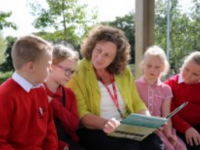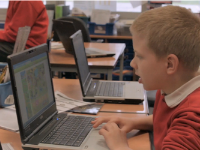Using fully virtual school-to-school peer review to enable action planning for improvement
Shakespeare Primary School, a member of the Schools Partnership Programme (SPP), is among the many schools that have benefitted from the SPP Rapid Response peer review model, designed to help schools respond to issues at speed and move forward with their improvement needs despite the onset of the Covid-19 pandemic. Shakespeare Primary’s application of the model’s framework and principles not only enabled them to continue to address existing issues in the midst of lockdown but also to seek that essential collaboration and feedback in a more efficient yet remote fashion.
The school is a two-form entry school in Honicknowle, Plymouth, with 420 pupils from Reception to Year 6 and an additional nursery unit. Part of the Learning Academies Trust, the school has a shared commitment with the wider Trust that every child deserves an outstanding education and that schools work most effectively when they work together. They have been a member of SPP since Autumn 2018.

Karen Menis
Headteacher, Shakespeare Primary School
Identifying challenges
Attainment in Year 2 had been identified as a focus area for the school, particularly around Literacy. One challenge identified was changes in staffing, which had resulted in two job-share arrangements in that year group. School leaders wanted to ensure consistency of teaching and learning outcomes across both classes, assessing the extent to which teachers are enabling Year 2 pupils to make expected or better progress in their learning.
Covid-19 presented further challenges surrounding engagement in usual models of peer review with partners from other schools as visits, group workshops and other forms of in-person collaboration were rendered impossible by lockdowns and other restrictions on social contact. That being the case, the SPP Rapid Response review process enabled remote reviewing and thereby contributed to continued engagement and improvement despite national lockdown.
Engaging with SPP
While lockdown, self-isolations and social distancing measures meant that pupil interviews and lesson observations were not possible as part of this review, the internal review team was able to conduct remote interviews with teachers using Zoom to gather evidence on how they are enabling pupils to meet or surpass expected outcomes in their learning. Similarly, they use d Zoom interviews to liaise with curriculum leaders and key stage leaders to gauge teachers’ ability to implement effective teaching strategies. This enabled the review team to highlight the strengths and areas for development within the Year 2 team.
d Zoom interviews to liaise with curriculum leaders and key stage leaders to gauge teachers’ ability to implement effective teaching strategies. This enabled the review team to highlight the strengths and areas for development within the Year 2 team.
Specifically, they identified the possible benefits of further developing systems and structures for teachers and leaders in the Year 2 team to enable effective feedback and communication, and thereby impact teaching and learning. This became the focus of an improvement workshop – also carried out remotely at the height of the national lockdown in January 2021. This virtual workshop made use of Google Jamboard for collaboration and breakout rooms for smaller group discussions. It led to an agreed action plan for the Year 2 teaching team, aimed at improving their communication and discussion opportunities, and enabling them to plan and rotate a timetable, allowing for more face-to-face contact and responsibility sharing.
On reflection
We are delighted that the Schools Partnership Programme is able to continue to help schools improve on existing challenges by probing around specific areas of concern in a constructive way, even amid the extreme challenges of the Covid-19 pandemic.
This Rapid Response review process not only proved that peer review can be conducted effectively using remote technologies, but that this process can be made even more efficient where necessary, while still creating meaningful, impactful changes for schools.